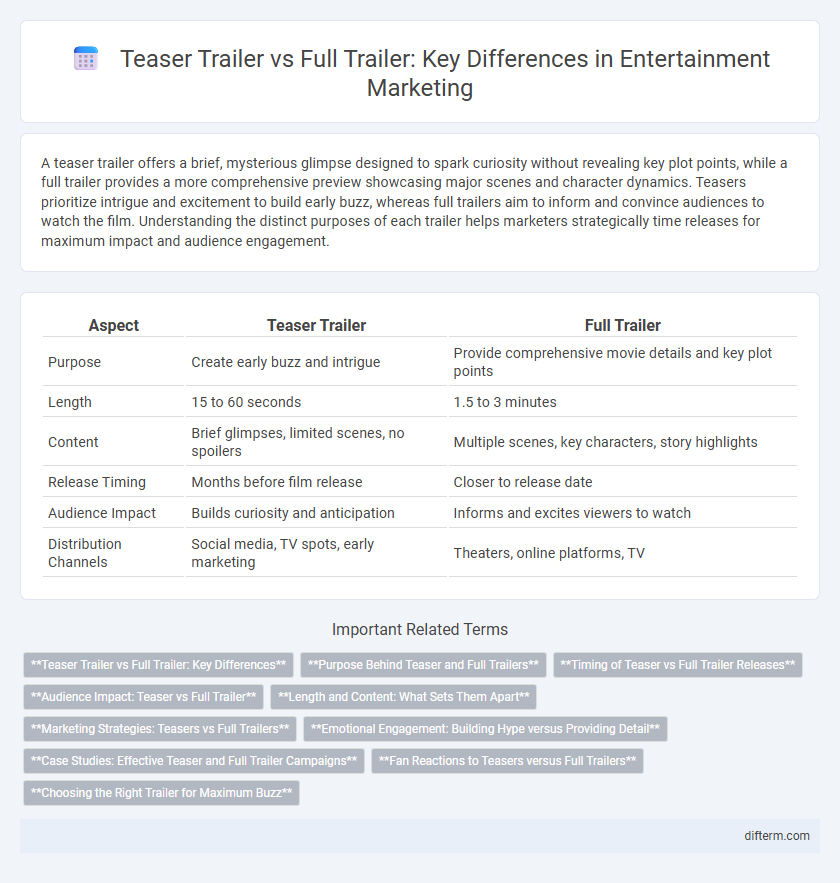A teaser trailer offers a brief, mysterious glimpse designed to spark curiosity without revealing key plot points, while a full trailer provides a more comprehensive preview showcasing major scenes and character dynamics. Teasers prioritize intrigue and excitement to build early buzz, whereas full trailers aim to inform and convince audiences to watch the film. Understanding the distinct purposes of each trailer helps marketers strategically time releases for maximum impact and audience engagement.
Table of Comparison
| Aspect | Teaser Trailer | Full Trailer |
|---|---|---|
| Purpose | Create early buzz and intrigue | Provide comprehensive movie details and key plot points |
| Length | 15 to 60 seconds | 1.5 to 3 minutes |
| Content | Brief glimpses, limited scenes, no spoilers | Multiple scenes, key characters, story highlights |
| Release Timing | Months before film release | Closer to release date |
| Audience Impact | Builds curiosity and anticipation | Informs and excites viewers to watch |
| Distribution Channels | Social media, TV spots, early marketing | Theaters, online platforms, TV |
Teaser Trailer vs Full Trailer: Key Differences
Teaser trailers typically last between 15 to 60 seconds, providing a brief glimpse of key characters or visuals to build initial excitement, whereas full trailers run from 2 to 3 minutes and offer a more comprehensive narrative overview. Teasers avoid revealing major plot points or spoilers, focusing instead on mood and tone, while full trailers showcase critical story elements, character arcs, and action sequences to deepen audience engagement. Marketing strategies leverage teaser trailers to generate early buzz, followed by full trailers that drive ticket pre-sales and broader promotional campaigns.
Purpose Behind Teaser and Full Trailers
Teaser trailers aim to generate early buzz and intrigue by providing a brief glimpse of key scenes without revealing major plot points, effectively building anticipation. Full trailers deliver a more detailed overview of the storyline, characters, and tone, helping viewers make informed decisions about watching the film. Both serve distinct marketing purposes in the entertainment industry's promotional timeline.
Timing of Teaser vs Full Trailer Releases
Teaser trailers typically debut several months before a film's release, generating early buzz by offering brief, intriguing glimpses without revealing key plot details. Full trailers usually follow closer to the premiere date, around 1-3 months prior, providing extensive content and a clearer storyline to boost audience anticipation. This staggered timing strategically sustains public interest over the marketing campaign's duration, maximizing promotional impact.
Audience Impact: Teaser vs Full Trailer
Teaser trailers generate initial excitement by offering a brief, mysterious glimpse that sparks curiosity and anticipation among audiences. Full trailers provide detailed storylines, character insights, and key plot points, deepening engagement and helping viewers decide whether to watch the film. The strategic use of both ensures sustained interest and maximizes audience turnout at release.
Length and Content: What Sets Them Apart
Teaser trailers typically last between 15 to 60 seconds, offering a brief glimpse of key scenes or themes to generate early excitement without revealing major plot points. Full trailers usually run from 2 to 3 minutes, providing a more comprehensive overview that highlights character arcs, story elements, and pivotal moments. The difference in length and detail allows teasers to build curiosity while full trailers aim to deepen audience engagement and anticipation.
Marketing Strategies: Teasers vs Full Trailers
Teaser trailers generate early buzz by providing brief, intriguing glimpses of an upcoming film or series, effectively igniting audience curiosity with minimal content. Full trailers deliver a more comprehensive view, revealing key plot points, characters, and tone to build stronger emotional connections and heighten anticipation. Marketing strategies leverage teasers to create initial awareness and maximize social media engagement, while full trailers drive conversions through detailed storytelling and targeted promotions.
Emotional Engagement: Building Hype versus Providing Detail
Teaser trailers create emotional engagement by delivering brief, mysterious glimpses that build hype and anticipation without revealing key plot details. Full trailers focus on providing detailed story elements, character introductions, and major set pieces to deepen investment and clarify the film's tone. Both formats strategically balance suspense and information to maximize audience interest before release.
Case Studies: Effective Teaser and Full Trailer Campaigns
Case studies of effective entertainment campaigns reveal that teaser trailers, such as Marvel's "Avengers: Endgame" teaser, successfully build anticipation by offering brief, mysterious glimpses that ignite fan speculation. Full trailers like the "Stranger Things" Season 4 trailer provide comprehensive story insights and character introductions, effectively expanding audience interest and driving higher viewership. Strategic timing and platform targeting in these campaigns significantly enhance engagement and boost box office or streaming performance.
Fan Reactions to Teasers versus Full Trailers
Fan reactions to teaser trailers often emphasize curiosity and speculation as these short previews offer only glimpses of plot and characters, sparking intense online discussions and theories. Full trailers typically generate more definitive responses, with fans analyzing detailed scenes, dialogue, and pacing, influencing pre-release hype and ticket sales. The contrast in fan engagement between teasers and full trailers reflects their distinct roles in marketing strategies and audience anticipation within the entertainment industry.
Choosing the Right Trailer for Maximum Buzz
Teaser trailers generate initial excitement by offering brief, intriguing glimpses that spark curiosity without revealing key plot details, making them ideal for early marketing phases. Full trailers provide more comprehensive story insights, character introductions, and high-impact moments to sustain and amplify audience interest closer to release dates. Selecting the right trailer depends on timing and marketing goals: teasers build anticipation and buzz early, while full trailers maximize engagement and pre-release hype.
teaser trailer vs full trailer Infographic

 difterm.com
difterm.com